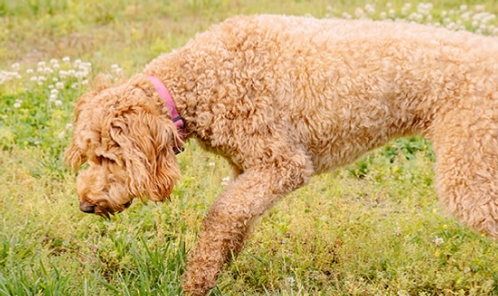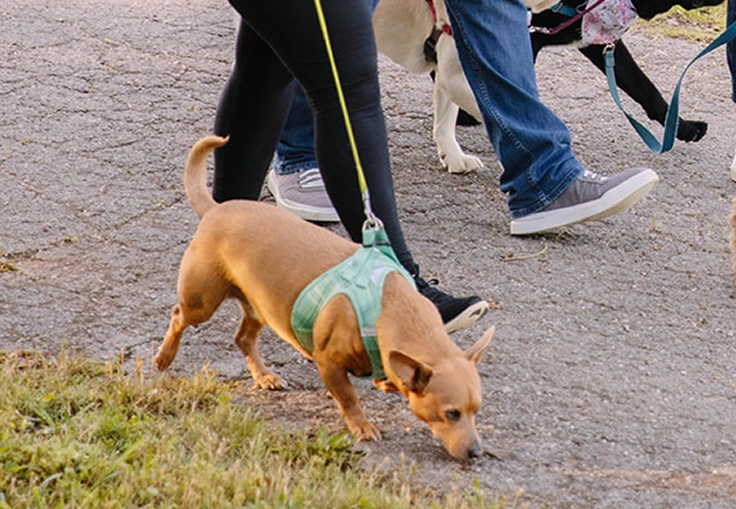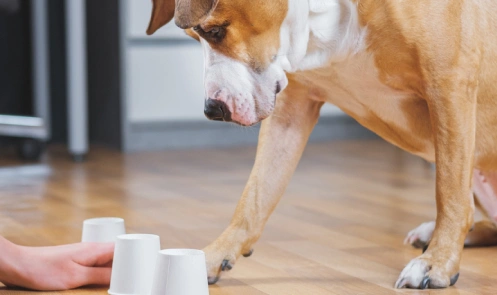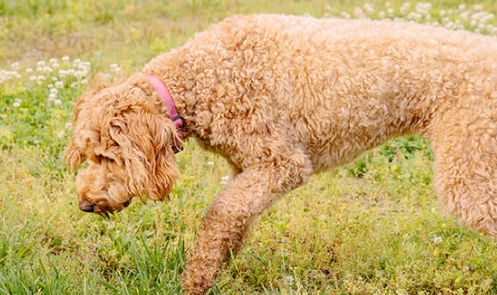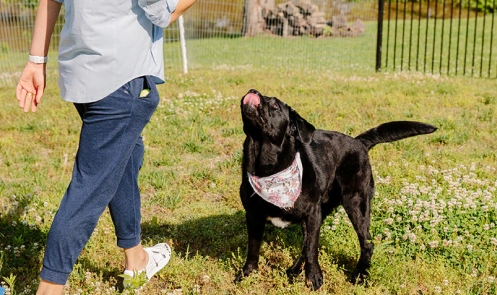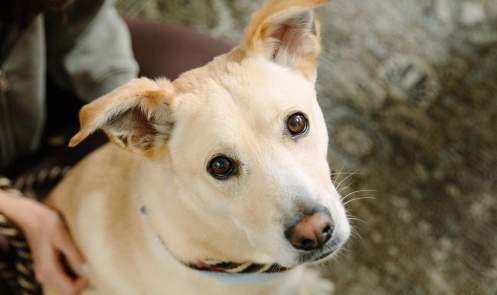Scent training for dogs taps into one of their impressive, natural abilities: their well-honed sense of smell. In recent years, scent work has gained popularity not just among professional handlers, but dog parents too — and for good reason. It offers dogs vital mental stimulation, as well as helps boost their confidence, strengthens their bond with their human companions, and provides them with a rewarding outlet for their instincts. So whether you’re looking for a way to enrich your dog’s life (kudos on that) or a new personal hobby (still valid!) scent training offers benefits for you both.
___________________________________________________________________________________________________
What is Scent Training for Dogs?
Scent training for dogs is the process of teaching a dog to locate and identify a specific odor. At its core, scent training (also known as scent work) leverages a dog’s innate olfactory abilities — which are estimated to be up to 100,000 times stronger than ours. This type of training mimics tasks performed by professional working dogs, such as those trained to detect explosives, narcotics or even medical conditions. While your dog might not need to sniff out contraband, recreational scent work channels these abilities into a structured and highly rewarding game that suits dogs of all backgrounds and skill levels. For a better sense of whether or not scent work makes sense for your dog, check out our guide to enriching activities based on your pup’s personality!
Benefits of Scent Work for Dogs
Scent training can provide profound emotional and cognitive benefits for dogs. Studies by researchers such as Charlotte Duranton and Alexandra Horowitz have shown that dogs engaged in scent work demonstrate signs of reduced stress and increased happiness. Some key advantages include:
-
Confidence: Dogs can gain independence and self-assurance through successful scent detection.
-
Joy in Learning: Scent games make training fun by fostering a love for learning new skills.
-
Autonomy: Dogs are encouraged to think critically and work independently, which supports emotional resilience.
-
A Human-Canine Bond: Working together on scent exercises can help strengthen trust and communication between a dog and their person.
How to Begin Scent Training Your Dog: ie. “Basic Training”
Scent training doesn’t necessarily require expensive tools or professional setups. You can easily begin at home using items you already have. Try these simple activities:
-
Find the Treat: Hide a tantalizing treat under one of several cups and encourage your dog to sniff out the correct one.
-
Treasure Hunts: Scatter treats around a room and encourage your dog to use their nose instead of their eyes to find them.
Always reward your dog generously when they succeed to keep the experience positive and motivating.
How to Scent Train Dogs Using Advanced Techniques and Processes
Once your dog masters the basics, you can move to more advanced techniques. Structured programs provide guidance for formalizing your dog’s scent detection skills.
Key Supplies for Successful Scent Training
Equip yourself with these essentials to support safety, hygiene and clarity as your dog progresses.
-
Cotton swabs for absorbing oils
-
Tweezers for handling swabs without contamination
-
Small glass jars with tight-fitting lids for storing scents
-
Scent vessels (small containers with holes)
-
Disposable gloves
-
Lidded plastic containers for hiding scent
Essential Oils and Their Uses for Scent Training
Essential oils such as birch oil are commonly used in formal scent training.
Important tips to remember:
-
Use sparingly: A single drop is powerful.
-
Prevent contamination: Always use gloves when handling.
-
Avoid products with xylitol: Some scent carriers may contain xylitol, a substance toxic to dogs.
First Steps in Scent Training
Here’s a simple step-by-step guide:
-
Prepare the scent: Dab a cotton swab with a small amount of essential oil.
-
Place the scent: Hide the scented swab inside a ventilated container.
-
Encourage exploration: Let your dog search for the scent in a distraction-free space.
-
Reward generously: Immediately reinforce the correct find with treats and praise.
Avoid introducing too many new scents at once, and refresh hiding spots often to keep the environment novel.
Rewarding Your Dog: High-Value Treats
High-value treats are crucial for maintaining your dog’s excitement and motivation during scent work. Choose treats that are extra tasty and different from their usual rewards. Nom Nom’s treats include single-ingredient jerky made with 100% meat, that can be easily broken into small, easy to chew pieces to make training sessions instantly rewarding!
___________________________________________________________________________________________________
Conclusion
Scent training taps into your dog’s incredible natural talents and provides a pathway to high confidence, good behavior and a deep bond between you and your pup. Whether you’re playing simple scent games at home or embarking on a competitive scent work journey, the benefits of this enriching activity are profound.
Further the Health of Your Dog with Nom Nom’s Stimulating Foods
Just as scent training nurtures your dog’s mental health, feeding them floor-licking delicious, nutritionally complete and balanced meals supports their nose-to-tail health and well-being. Nom Nom’s variety of recipes are gently cooked in small batches using whole food ingredients, and are designed by our team of PhD and veterinary nutritionists to optimize your dog’s health at every life stage.
Make mealtime an adventure by treating them to a Nom Nom Sampler Pack — a perfect way to find your dog’s favorite recipe.
Or Subscribe today for a meal plan customized to your dog’s needs, in order to provide your pup mealtime excitement, balanced nutrition AND every day enrichment!
Dog Scent Training FAQs
**At what age can I start scent training my dog?****
**You can start simple scent games as early as 8 weeks old, tailoring activities to suit your puppy’s attention span.
**Can any dog learn scent work?****
**Yes! All dogs, regardless of age, breed or background can enjoy and excel at scent work.
**How long should scent training sessions be?****
**Keep sessions short and fun — about 5 to 10 minutes for beginners — gradually increasing as your dog builds stamina.
**How do I know if my dog has found the scent?****
**Dogs typically show interest by pausing, sniffing intensely, sitting or looking at you when they locate the scent.
**What is competitive scent work, and how can my dog get involved?****
**Competitive scent work challenges dogs to locate target odors in controlled settings. Many local training centers offer introductory courses and trial opportunities.
**How can I find local scent work classes for my dog?****
**Check with local dog training facilities or search online directories, or ask your veterinarian for recommendations on scent work classes near you.
